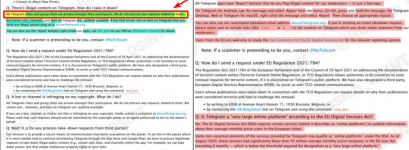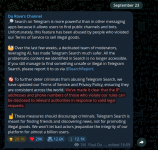d0ctrine
Diamond
- Joined
- 17.08.24
- Messages
- 107
- Reaction score
- 4,260
- Points
- 93
Telegram CEO Pavel Durov detained at Paris airport, sparking controversy

Messaging app founder's arrest linked to platform moderation concerns
In an unexpected turn of events, Pavel Durov, the founder and CEO of Telegram, was reportedly arrested at Le Bourget airport near Paris on Saturday evening. French media outlets TF1 TV and BFM TV broke the news, citing unnamed sources close to the situation.
Durov, known for his jet-setting lifestyle, was apparently caught off guard when French authorities detained him upon arrival in his private jet. The arrest stems from an ongoing preliminary police investigation, with the focus squarely on Telegram's moderation practices – or lack thereof, as some critics argue.
At the heart of the matter is the concern that Telegram's hands-off approach to content moderation might be giving criminal activities a free pass on the platform. It's a sticky situation that's been brewing for a while, with various governments eyeing the app's operations with increasing scrutiny.
For those not in the loop, Durov's no stranger to butting heads with authorities. He launched Telegram after leaving Russia in 2014, following a showdown with officials over censorship on his previous social media platform, VK. Since then, Telegram has grown into a messaging powerhouse, boasting an impressive 900 million active users.
Durov has long maintained that Telegram should be a "neutral platform," steering clear of geopolitical entanglements. But this arrest suggests that staying neutral might be easier said than done in today's complex digital landscape.
As of now, both the French Interior Ministry and police are keeping tight-lipped about the situation. Telegram's team is equally silent, leaving us all wondering what's next in this unfolding drama.
This high-profile arrest is bound to reignite debates about the responsibilities of tech platforms in moderating content and combating online crime. It also serves as a stark reminder that even influential tech leaders aren't immune to legal challenges as governments grapple with regulating the digital frontier.
As this story develops, it's clear that the intersection of technology, free speech, and law enforcement is more complex than ever. Stay tuned for updates on this intriguing case that could have far-reaching implications for the future of online communication.

Messaging app founder's arrest linked to platform moderation concerns
In an unexpected turn of events, Pavel Durov, the founder and CEO of Telegram, was reportedly arrested at Le Bourget airport near Paris on Saturday evening. French media outlets TF1 TV and BFM TV broke the news, citing unnamed sources close to the situation.
Durov, known for his jet-setting lifestyle, was apparently caught off guard when French authorities detained him upon arrival in his private jet. The arrest stems from an ongoing preliminary police investigation, with the focus squarely on Telegram's moderation practices – or lack thereof, as some critics argue.
At the heart of the matter is the concern that Telegram's hands-off approach to content moderation might be giving criminal activities a free pass on the platform. It's a sticky situation that's been brewing for a while, with various governments eyeing the app's operations with increasing scrutiny.
For those not in the loop, Durov's no stranger to butting heads with authorities. He launched Telegram after leaving Russia in 2014, following a showdown with officials over censorship on his previous social media platform, VK. Since then, Telegram has grown into a messaging powerhouse, boasting an impressive 900 million active users.
Durov has long maintained that Telegram should be a "neutral platform," steering clear of geopolitical entanglements. But this arrest suggests that staying neutral might be easier said than done in today's complex digital landscape.
As of now, both the French Interior Ministry and police are keeping tight-lipped about the situation. Telegram's team is equally silent, leaving us all wondering what's next in this unfolding drama.
This high-profile arrest is bound to reignite debates about the responsibilities of tech platforms in moderating content and combating online crime. It also serves as a stark reminder that even influential tech leaders aren't immune to legal challenges as governments grapple with regulating the digital frontier.
As this story develops, it's clear that the intersection of technology, free speech, and law enforcement is more complex than ever. Stay tuned for updates on this intriguing case that could have far-reaching implications for the future of online communication.





